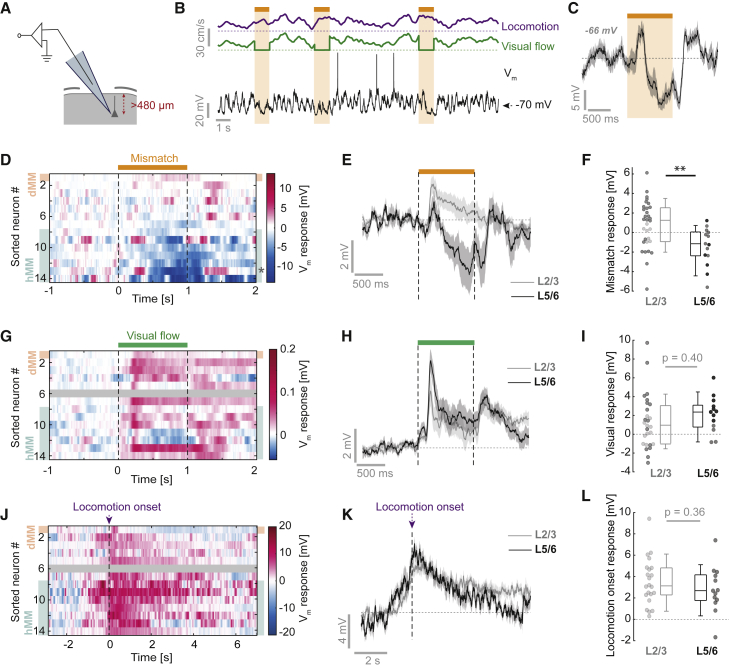Figure 6.
Deep-Layer Neurons Show a Lack of dMM Responses
(A) Neurons recorded at a vertical depth greater than 480 μm were classified as putative L5/6 neurons.
(B) Example Vm trace (black) from a putative L5/6 neuron recorded during the closed-loop condition with mismatch stimuli (orange bar and shading). Dotted lines indicate 0 cm/s.
(C) Average Vm response to mismatch stimulus for the example neuron in (B). Shading indicates SEM over 13 trials. The value in gray bold italics indicates the mean pre-locomotion voltage.
(D) Heatmap of average Vm responses to mismatch across all L5/6 neurons. Neurons are sorted by average mismatch response. Neurons were assigned dMM (orange shading) or hMM (turquoise shading) according to the same criteria used for L2/3 neurons: mismatch responses of at least 1 or −1 mV, respectively.
(E) Average response to mismatch across all L5/6 neurons (black, 14 neurons) compared with the average response to mismatch across all L2/3 neurons (gray, 32 neurons). Shading indicates SEM over neurons. Average pre-mismatch voltages were −68 ± 8 mV for L2/3 neurons and −64 ± 9 mV for L5/6 neurons.
(F) Average mismatch responses of L2/3 and L5/6 neurons. Dark data points indicate neurons with a significant response to mismatch. ∗∗p < 0.01, t test.
(G) As in (D), but for visual flow responses. Gray shading indicates a neuron with insufficient data.
(H) As in (E), but for visual flow responses. Average pre-visual stimulus voltages were −64 ± 8 mV for L2/3 neurons and −63 ± 9 mV for L5/6 neurons.
(I) As in (F), but for visual flow responses. Dark data points indicate neurons with a significant response to visual flow.
(J) As in (D), but for locomotion onset responses. Average pre-running onset voltages were −64 ± 8 mV for L2/3 neurons and −62 ± 7 mV for L5/6 neurons.
(K) As in (E), but for locomotion onset responses.
(L) As in (F), but for locomotion onset responses.

